高二英语精选情态动词练习题35道
高二英语情态动词+have done结构用法单选题40题

高二英语情态动词+have done结构用法单选题40题1.He didn't answer my call. He must have been busy.A.must have beenB.can have beenC.should have beenD.could have been答案:A。
“must have been”表示对过去事情的肯定推测,他没接我电话,肯定是很忙。
“can have been”一般用于否定句和疑问句中表示推测;“should have been”表示本应该;“could have been”表示可能是,语气比“must have been”弱。
2.The ground is wet. It must have rained last night.A.must have rainedB.can have rainedC.should have rainedD.could have rained答案:A。
“must have rained”对过去事情的肯定推测,地面是湿的,肯定是昨晚下雨了。
“can have rained”一般用于否定句和疑问句中;“should have rained”表示本应该下雨;“could have rained”表示可能下雨,语气比“must have rained”弱。
3.She looks very tired. She must have worked hard yesterday.A.must have workedB.can have workedC.should have workedD.could have worked答案:A。
“must have worked”对过去事情的肯定推测,她看起来很累,肯定是昨天努力工作了。
“can have worked”一般用于否定句和疑问句中;“should have worked”表示本应该工作;“could have worked”表示可能工作,语气比“must have rained”弱。
(英语)高二英语情态动词题20套(带答案)

(英语)高二英语情态动词题20套(带答案)一、单项选择情态动词1.It wasn’t right to me that such near neighbors not know one another.A.could B.wouldC.should D.might【答案】C【解析】【详解】考查情态动词。
句意:对我来说,很不正常,如此近的邻居居然不认识。
A. could可能,能够;B. would将;C. should竟然;D. might可能,也许。
should 作为情态动词,可以用来表示意外、惊喜或者在说话人看来是不可思议的,常常译为"竟会"、"居然",住的这么近的邻居居然不认识。
表示意外,所以答案选C。
【点睛】should的用法1、should 作为情态动词,通常用来表示现在或将来的责任或义务,译作“应该”、“应当”,这时它可以和 ought to, be supposed to 互换使用.例如:You should (= ought to ) tell your mother about it at once.2、should 作为情态动词,可以用在条件状语从句中,表示语气较强的假设,译作“万一”、“竟然”,这时也可将 should 置于从句之首,即将 should 放在主语前面,而省略从属连词 if。
例如:If you should fail to come, ask Mrs Chen to work in your place. (= Should you fail to come, ask Mrs Chen to work in your place. )3、should 作为情态动词,可以表示谦逊、客气、委婉之意,译为“可……”、“倒……”。
例如:I should say that it would be better to try it again.4、should 作为情态动词,可以用来表示意外、惊喜或者在说话人看来是不可思议的.尤其在以 why, who, how 等开头的修辞疑问句或某些感叹句中常常译为“竟会”、“居然”。
高二英语情态动词推测用法练习题30题
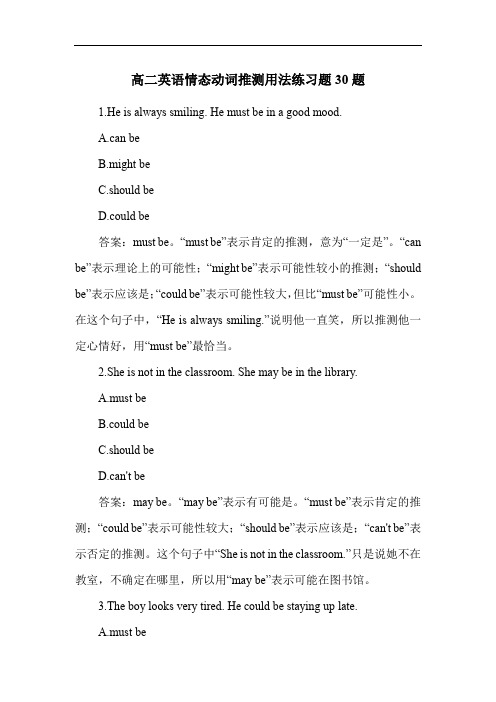
高二英语情态动词推测用法练习题30题1.He is always smiling. He must be in a good mood.A.can beB.might beC.should beD.could be答案:must be。
“must be”表示肯定的推测,意为“一定是”。
“can be”表示理论上的可能性;“might be”表示可能性较小的推测;“should be”表示应该是;“could be”表示可能性较大,但比“must be”可能性小。
在这个句子中,“He is always smiling.”说明他一直笑,所以推测他一定心情好,用“must be”最恰当。
2.She is not in the classroom. She may be in the library.A.must beB.could beC.should beD.can't be答案:may be。
“may be”表示有可能是。
“must be”表示肯定的推测;“could be”表示可能性较大;“should be”表示应该是;“can't be”表示否定的推测。
这个句子中“She is not in the classroom.”只是说她不在教室,不确定在哪里,所以用“may be”表示可能在图书馆。
3.The boy looks very tired. He could be staying up late.A.must beB.might beC.should beD.can't be答案:could be。
“could be”表示可能性较大的推测。
“must be”表示肯定的推测;“might be”表示可能性较小;“should be”表示应该是;“can't be”表示否定的推测。
这里“The boy looks very tired.”只是看起来累,所以用“could be”表示可能熬夜了。
【英语】高二英语情态动词题20套(带答案)含解析

【英语】高二英语情态动词题20套(带答案)含解析一、单项选择情态动词1.No student ________ go out of school to have lunch without permission of the headteacher. A.might B.mustC.shall D.could【答案】C【解析】【详解】考查情态动词。
句意:未经校长允许,任何学生不得离开学校去吃午饭。
might可能;must一定,必须;shall会,将;could能够。
本句是一条禁令。
shall用于肯定句并且主语是第一、三人称时,表示允诺,警告,劝告等语气。
故选C。
2.You ________ give me a lift. I want to walk home for exercise.A.needn’t B.couldn’t C.can’t D.mustn’t【答案】A【解析】【详解】考查情态动词。
句意:你不必让我搭车。
我想步行回家锻炼身体。
A. needn’t不必;B. couldn’t不能;C. can’t不会;D. mustn’t禁止,不允许。
根据I want to walk home for exercise.可知,你不必让我搭车。
故选A。
考点:考查情态动词3.While it wasn’t the goal of the trip, I was rewarded with fresh insights, ones that ________ to me during the regular course of business.A.might never happen B.could never have happenedC.should not happen D.needn’t have happened【答案】B【解析】【详解】考查虚拟语气。
句意:虽然这并不是这次旅行的目的,但我得到了一些新的领悟,那些领悟在我的日常生活中是本不可能发生的。
高二英语情态动词need和dare辨析单选题40题
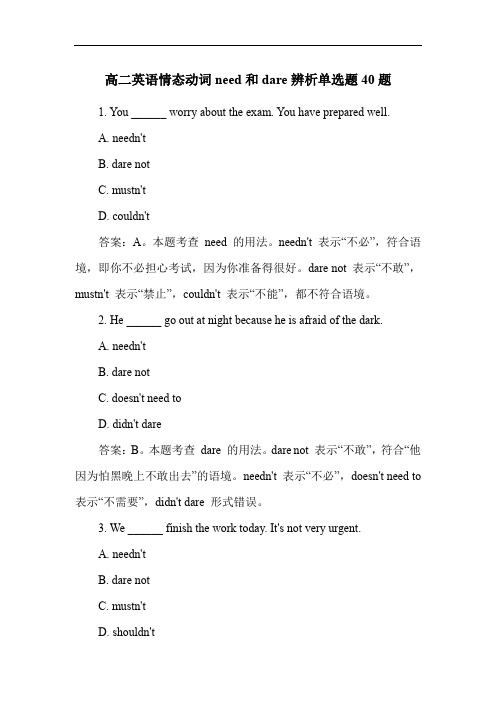
高二英语情态动词need和dare辨析单选题40题1. You ______ worry about the exam. You have prepared well.A. needn'tB. dare notC. mustn'tD. couldn't答案:A。
本题考查need 的用法。
needn't 表示“不必”,符合语境,即你不必担心考试,因为你准备得很好。
dare not 表示“不敢”,mustn't 表示“禁止”,couldn't 表示“不能”,都不符合语境。
2. He ______ go out at night because he is afraid of the dark.A. needn'tB. dare notC. doesn't need toD. didn't dare答案:B。
本题考查dare 的用法。
dare not 表示“不敢”,符合“他因为怕黑晚上不敢出去”的语境。
needn't 表示“不必”,doesn't need to 表示“不需要”,didn't dare 形式错误。
3. We ______ finish the work today. It's not very urgent.A. needn'tB. dare notC. mustn'tD. shouldn't答案:A。
这里needn't 表示“不必”,意思是我们今天不必完成这项工作,它不是很紧急。
dare not 是“不敢”,mustn't 是“禁止”,shouldn't 是“不应该”,都不符合题意。
4. She ______ speak English in public, but she does it very well now.A. dare notB. needn'tC. didn't dare toD. doesn't need to答案:C。
高二英语情态动词推测用法单选题40题(带答案)
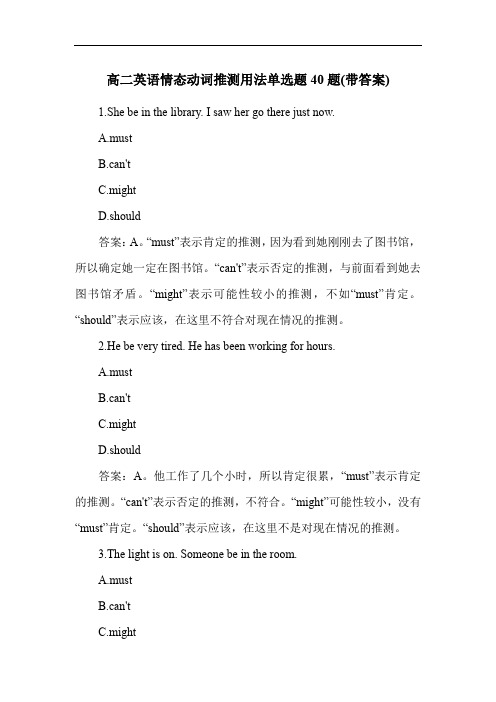
高二英语情态动词推测用法单选题40题(带答案)1.She be in the library. I saw her go there just now.A.mustB.can'tC.mightD.should答案:A。
“must”表示肯定的推测,因为看到她刚刚去了图书馆,所以确定她一定在图书馆。
“can't”表示否定的推测,与前面看到她去图书馆矛盾。
“might”表示可能性较小的推测,不如“must”肯定。
“should”表示应该,在这里不符合对现在情况的推测。
2.He be very tired. He has been working for hours.A.mustB.can'tC.mightD.should答案:A。
他工作了几个小时,所以肯定很累,“must”表示肯定的推测。
“can't”表示否定的推测,不符合。
“might”可能性较小,没有“must”肯定。
“should”表示应该,在这里不是对现在情况的推测。
3.The light is on. Someone be in the room.A.mustB.can'tC.mightD.should答案:A。
灯亮着,所以肯定有人在房间里,“must”表示肯定的推测。
“can't”表示否定的推测,与灯亮着矛盾。
“might”可能性较小,不如“must”肯定。
“should”表示应该,不是对现在情况的推测。
4.She be at home. I just called and no one answered.A.mustB.can'tC.mightD.should答案:B。
刚刚打电话没人接,所以肯定不在家,“can't”表示否定的推测。
“must”表示肯定的推测,不符合。
“might”可能性较小,这里根据打电话没人接可以确定不在家。
“should”表示应该,不是对现在情况的推测。
(英语)高二英语情态动词专项训练100(附答案)含解析
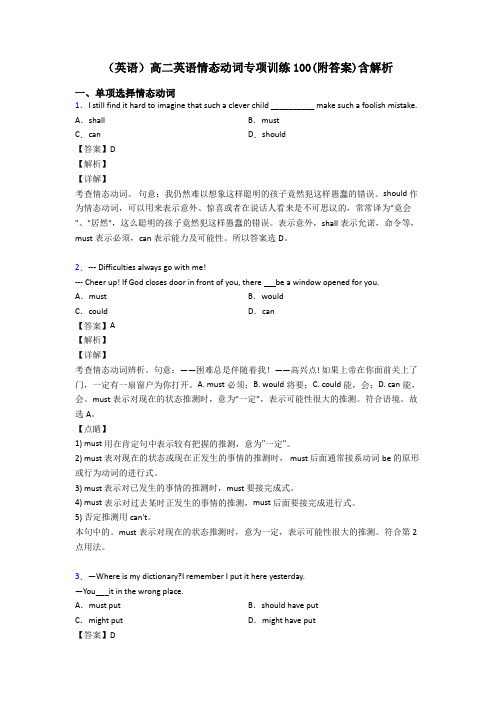
(英语)高二英语情态动词专项训练100(附答案)含解析一、单项选择情态动词1.I still find it hard to imagine that such a clever child __________ make such a foolish mistake. A.shall B.mustC.can D.should【答案】D【解析】【详解】考查情态动词。
句意:我仍然难以想象这样聪明的孩子竟然犯这样愚蠢的错误。
should 作为情态动词,可以用来表示意外、惊喜或者在说话人看来是不可思议的,常常译为"竟会"、"居然",这么聪明的孩子竟然犯这样愚蠢的错误。
表示意外,shall表示允诺,命令等,must表示必须,can表示能力及可能性。
所以答案选D。
2.--- Difficulties always go with me!--- Cheer up! If God closes door in front of you, there be a window opened for you. A.must B.wouldC.could D.can【答案】A【解析】【详解】考查情态动词辨析。
句意:——困难总是伴随着我!——高兴点! 如果上帝在你面前关上了门,一定有一扇窗户为你打开。
A. must必须;B. would将要;C. could能,会;D. can能,会。
must表示对现在的状态推测时,意为“一定”,表示可能性很大的推测。
符合语境。
故选A。
【点睛】1) must用在肯定句中表示较有把握的推测,意为"一定"。
2) must表对现在的状态或现在正发生的事情的推测时, must 后面通常接系动词be 的原形或行为动词的进行式。
3) must 表示对已发生的事情的推测时,must 要接完成式。
4) must表示对过去某时正发生的事情的推测,must 后面要接完成进行式。
高二英语情态动词和虚拟语气单选题30题(带答案)
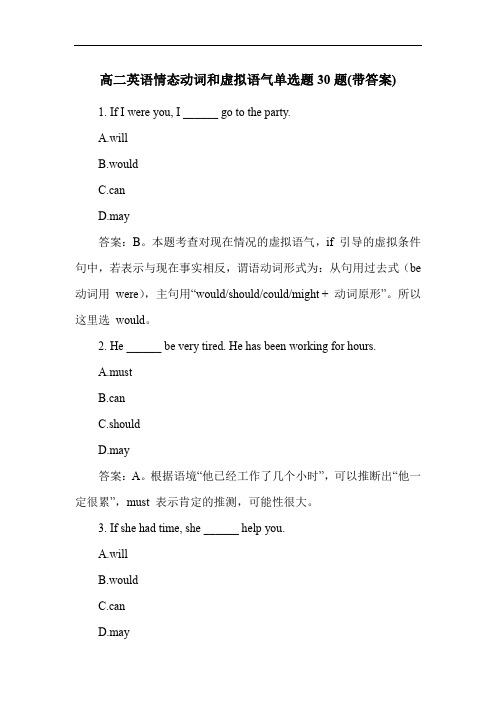
高二英语情态动词和虚拟语气单选题30题(带答案)1. If I were you, I ______ go to the party.A.willB.wouldC.canD.may答案:B。
本题考查对现在情况的虚拟语气,if 引导的虚拟条件句中,若表示与现在事实相反,谓语动词形式为:从句用过去式(be 动词用were),主句用“would/should/could/might + 动词原形”。
所以这里选would。
2. He ______ be very tired. He has been working for hours.A.mustB.canC.shouldD.may答案:A。
根据语境“他已经工作了几个小时”,可以推断出“他一定很累”,must 表示肯定的推测,可能性很大。
3. If she had time, she ______ help you.A.willB.wouldC.canD.may答案:B。
同第一题,对现在情况的虚拟语气,选would。
4. You ______ finish your homework before you watch TV.A.mustB.canC.shouldD.may答案:A。
must 表示“必须”,符合语境“在看电视之前必须完成作业”。
5. If I knew his number, I ______ call him.A.willB.wouldC.canD.may答案:B。
对现在情况的虚拟语气,选would。
6. He ______ know the answer. He looks so confident.A.mustB.canC.shouldD.may答案:A。
根据“他看起来很自信”,推断出“他一定知道答案”,must 表示肯定的推测。
7. If I were a bird, I ______ fly freely.A.willB.wouldC.canD.may答案:B。
高二英语情态动词和虚拟语气单选题30题
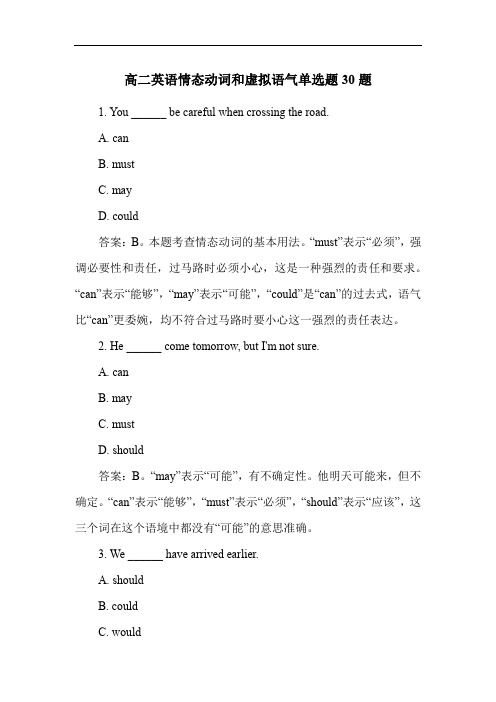
高二英语情态动词和虚拟语气单选题30题1. You ______ be careful when crossing the road.A. canB. mustC. mayD. could答案:B。
本题考查情态动词的基本用法。
“must”表示“必须”,强调必要性和责任,过马路时必须小心,这是一种强烈的责任和要求。
“can”表示“能够”,“may”表示“可能”,“could”是“can”的过去式,语气比“can”更委婉,均不符合过马路时要小心这一强烈的责任表达。
2. He ______ come tomorrow, but I'm not sure.A. canB. mayC. mustD. should答案:B。
“may”表示“可能”,有不确定性。
他明天可能来,但不确定。
“can”表示“能够”,“must”表示“必须”,“should”表示“应该”,这三个词在这个语境中都没有“可能”的意思准确。
3. We ______ have arrived earlier.A. shouldB. couldC. wouldD. might答案:A。
“should have done”表示“本应该做某事而没做”,我们本应该早点到的。
“could have done”表示“本能够做某事而没做”,“would have done”表示“过去本会做某事而没做”,“might have done”表示“过去可能做某事而没做”,这里强调本应该早点到,用“should”。
4. You ______ tell him the truth. It's a secret.A. mustn'tB. needn'tC. shouldn'tD. couldn't答案:A。
“mustn't”表示“禁止,不许”,这是个秘密,你不许告诉他真相。
“needn't”表示“不必”,“shouldn't”表示“不应该”,“couldn't”表示“不能”,都没有“禁止”的意思强烈。
高二英语情态动词表许可用法单选题30题
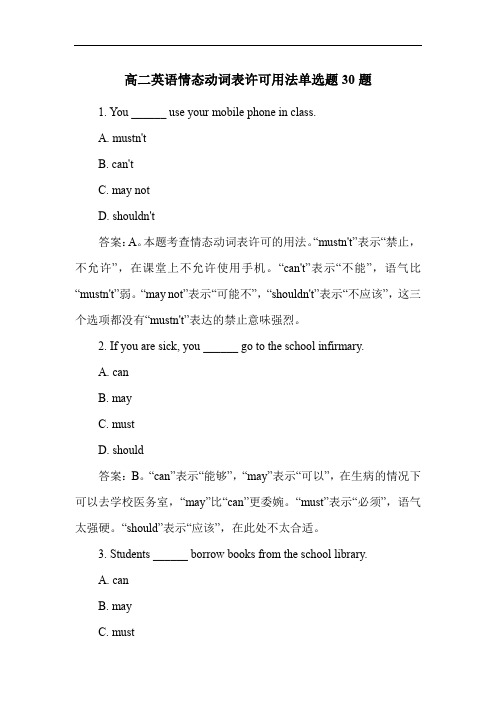
高二英语情态动词表许可用法单选题30题1. You ______ use your mobile phone in class.A. mustn'tB. can'tC. may notD. shouldn't答案:A。
本题考查情态动词表许可的用法。
“mustn't”表示“禁止,不允许”,在课堂上不允许使用手机。
“can't”表示“不能”,语气比“mustn't”弱。
“may not”表示“可能不”,“shouldn't”表示“不应该”,这三个选项都没有“mustn't”表达的禁止意味强烈。
2. If you are sick, you ______ go to the school infirmary.A. canB. mayC. mustD. should答案:B。
“can”表示“能够”,“may”表示“可以”,在生病的情况下可以去学校医务室,“may”比“can”更委婉。
“must”表示“必须”,语气太强硬。
“should”表示“应该”,在此处不太合适。
3. Students ______ borrow books from the school library.A. canB. mayC. mustD. will答案:A。
“can”和“may”都可以表示“可以”,但“can”更强调能力,“may”更强调许可。
这里强调学生有从学校图书馆借书的能力和许可,“can”更合适。
“must”表示“必须”,“will”表示“将要”,都不符合题意。
4. You ______ leave the classroom without permission.A. mustn'tB. can'tC. may notD. shouldn't答案:A。
“mustn't”表示“禁止,不允许”,没有得到许可不能离开教室。
“can't”表示“不能”,语气比“mustn't”弱。
高二英语情态动词特殊用法单选题40题

高二英语情态动词特殊用法单选题40题1. He ______ play the piano very well when he was only five.A. canB. couldC. mayD. might答案:B。
本题考查could 表示过去的能力。
A 选项can 用于现在的能力;C 选项may 表示可能、许可;D 选项might 可能性较may 更低。
这里说他五岁时就能弹得很好,是过去的能力,所以用could。
2. -Could I borrow your bike?-Yes, of course you ______.A. couldB. canC. willD. should答案:B。
本题考查could 表示请求许可时,回答用can。
A 选项could 用于请求,回答不用;C 选项will 表示意愿、将来;D 选项should 表示应该。
所以这里用can 表示许可。
3. The man is so strong that he ______ lift the heavy box.A. canB. couldD. must答案:A。
本题考查can 表示现在的能力。
B 选项could 是过去的能力;C 选项may 表示可能;D 选项must 表示必须。
这里是说这个人现在很强壮能举起重箱子,用can。
4. It's so dark. I'm not sure if he ______ come.A. canB. couldC. mayD. must答案:A。
本题考查can 表示可能性。
B 选项could 可能性较can 低;C 选项may 也表示可能性,但语气较弱;D 选项must 表示肯定推测。
这里不确定他是否能来,用can 更合适。
5. She ______ speak several languages.A. canB. couldC. mayD. might答案:A。
高二英语情态动词否定用法单选题40题

高二英语情态动词否定用法单选题40题1. You can't smoke here. It's forbidden.A. can'tB. mustn'tC. shouldn'tD. needn't答案:A。
本题中“can't”表示“不能”,强调没有能力或者不被允许。
“mustn't”表示“禁止”,语气很强。
“shouldn't”表示“不应该”,侧重于道义上的不合适。
“needn't”表示“不必”。
这里说这里禁止吸烟,强调不被允许,所以用“can't”。
2. We mustn't be late for the meeting.A. can'tB. shouldn'tC. mustn'tD. needn't答案:C。
“mustn't”在本题中表示“禁止,一定不要”,强调绝对不允许迟到。
“can't”表示“不能”,“shouldn't”表示“不应该”,语气不如“mustn't”强烈,“needn't”表示“不必”,不符合语境。
3. You shouldn't eat too much junk food. It's bad for your health.A. can'tB. mustn'tC. shouldn't答案:C。
“shouldn't”在此处表示“不应该”,指从道理上讲不应当吃太多垃圾食品。
“can't”表示“不能”,“mustn't”表示“禁止”,“needn't”表示“不必”,都不符合此处的意思。
4. You needn't come if you don't want to.A. can'tB. mustn'tC. shouldn'tD. needn't答案:D。
2024年高二英语情态动词need和dare辨析练习题40题

2024年高二英语情态动词need和dare辨析单选题40题1.You needn't hand in your homework today. It's optional.needn'tmustn'tshouldn'tcan't答案:needn't。
needn't 表示“不必”,在这句话中意思是今天交作业不是必须的,是可选的。
mustn't 表示“禁止”;shouldn't 表示“不应该”;can't 表示“不能”。
2.He dare not speak in public.doesn't daredaren'tneedn'tmustn't答案:daren't。
dare not 的缩写形式是daren't,表示“不敢”。
doesn't dare 后需接动词原形;needn't 表示“不必”;mustn't 表示“禁止”。
3.She need to study harder to pass the exam.needsneedn'tmustn'tcan't答案:needs。
she 是第三人称单数,need 作实义动词时后面跟动词不定式,且主语是第三人称单数时要用needs。
needn't 表示“不必”;mustn't 表示“禁止”;can't 表示“不能”。
4.We dare to challenge ourselves.don't darearen't dareneedn'tmustn't答案:dare to。
dare to do sth 表示“敢于做某事”。
don't dare 后需接动词原形;aren't dare 表述错误;needn't 表示“不必”;mustn't 表示“禁止”。
高二英语情态动词用法辨析单选题40题

高二英语情态动词用法辨析单选题40题1. Tom is very good at math. He _____ solve difficult math problems easily.A.canB.mayC.mustD.should答案:A。
“can”表示有能力做某事,在这里表示汤姆有能力轻松地解决难题。
“may”表示可能;“must”表示必须;“should”表示应该,这三个选项都不符合语境。
2. I _____ play the piano when I was young, but now I'm out of practice.A.canB.couldC.mayD.might答案:B。
“could”表示过去有能力做某事,句子中说小时候会弹钢琴,用“could”。
“can”表示现在的能力;“may”和“might”表示可能,均不符合语境。
3. She _____ speak three languages fluently.A.canB.mustC.shouldD.need答案:A。
“can”表示有能力做某事,这里表示她有能力流利地说三种语言。
“must”表示必须;“should”表示应该;“need”表示需要,都不符合语境。
4. With enough practice, you _____ improve your English speaking skills.A.canB.mustC.shouldD.need答案:A。
“can”表示有能力做某事,经过足够的练习你有能力提高英语口语技能。
“must”表示必须;“should”表示应该;“need”表示需要,均不合适。
5. He _____ swim very well, but he hasn't been to the pool for a long time.A.canB.mayC.mustD.should答案:A。
高二英语情态动词特殊用法单选题40题

高二英语情态动词特殊用法单选题40题1.The man in the hat be Mr. Smith. I'm not sure.A.mustB.mightC.can'tD.should答案:B。
本题考查情态动词表示推测的用法。
must 表示肯定的推测,语气最强;might 表示可能性较小的推测;can't 表示否定的推测;should 通常表示应该。
在这个语境中,“I'm not sure”表明不确定,所以用might 表示可能性较小的推测。
2.There be someone in the room. I heard a noise.A.mustB.shouldC.couldD.would答案:A。
本题考查情态动词表示推测的用法。
must 表示肯定的推测,语气最强;should 表示应该;could 表示可能性较小的推测;would 表示过去的习惯或意愿。
听到了声音,所以有很强烈的推测有人在房间里,用must。
3.The book be on the table. I left it there yesterday.A.mustB.shouldC.couldD.might答案:A。
本题考查情态动词表示推测的用法。
must 表示肯定的推测,语气最强;should 表示应该;could 表示可能性较小的推测;might 表示可能性更小的推测。
因为明确说昨天放在那里了,所以用must 肯定在桌子上。
4.She be at home now. She usually goes out on Sunday.A.can'tB.mustC.shouldD.might答案:A。
本题考查情态动词表示推测的用法。
can't 表示否定的推测;must 表示肯定的推测;should 表示应该;might 表示可能性较小的推测。
根据“She usually goes out on Sunday”可知她周日通常不在家,所以用can't 否定推测她现在不在家。
高二英语情态动词表推测的反义疑问句形式单选题30题
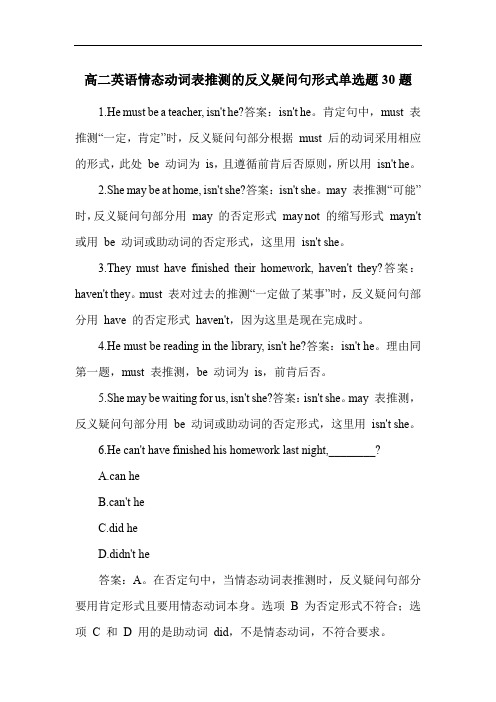
高二英语情态动词表推测的反义疑问句形式单选题30题1.He must be a teacher, isn't he?答案:isn't he。
肯定句中,must 表推测“一定,肯定”时,反义疑问句部分根据must 后的动词采用相应的形式,此处be 动词为is,且遵循前肯后否原则,所以用isn't he。
2.She may be at home, isn't she?答案:isn't she。
may 表推测“可能”时,反义疑问句部分用may 的否定形式may not 的缩写形式mayn't 或用be 动词或助动词的否定形式,这里用isn't she。
3.They must have finished their homework, haven't they?答案:haven't they。
must 表对过去的推测“一定做了某事”时,反义疑问句部分用have 的否定形式haven't,因为这里是现在完成时。
4.He must be reading in the library, isn't he?答案:isn't he。
理由同第一题,must 表推测,be 动词为is,前肯后否。
5.She may be waiting for us, isn't she?答案:isn't she。
may 表推测,反义疑问句部分用be 动词或助动词的否定形式,这里用isn't she。
6.He can't have finished his homework last night,________?A.can heB.can't heC.did heD.didn't he答案:A。
在否定句中,当情态动词表推测时,反义疑问句部分要用肯定形式且要用情态动词本身。
选项B 为否定形式不符合;选项C 和D 用的是助动词did,不是情态动词,不符合要求。
高二英语情态动词题20套(带答案)

高二英语情态动词题20套(带答案)一、单项选择情态动词1.—What’s wrong with you?—Oh, I am sick. I ________ so much ice cream just now.A.shouldn’t eat B.mustn’t eatC.couldn’t have eaten D.shouldn’t have eaten【答案】D【解析】【详解】考查情态动词和虚拟语气。
句意:——你怎么了?——我生病了,我刚才不应该吃那么多冰激凌。
A. shouldn’t eat不应该吃;B. mustn’t eat禁止吃;C. couldn’t have eaten不可能吃;D. shouldn’t have eaten本来不应该吃。
根据just now可知,是发生在过去,故选D。
2.-–Mary knows the city quite well.--She______ well have been there before.A.need B.could C.should D.may【答案】D【解析】【分析】【详解】考查情态动词辨析。
句意:——Mary非常了解这个城市。
——她肯定以前在那里呆过。
may have done过去可能做过某事。
表示对过去的肯定猜测。
need have done本需要做某事却没做;could have done本可以做某事却没做;should have done本应该做某事却没做。
故选D。
3.—Did you attend the meeting for the experiment project yesterday?—Yes, but I don’t think I ____ because my director was there.A.need to have B.need to C.needed to D.need have【答案】D【解析】【分析】【详解】考查情态动词+have done。
高考英语 语法精练情态动词
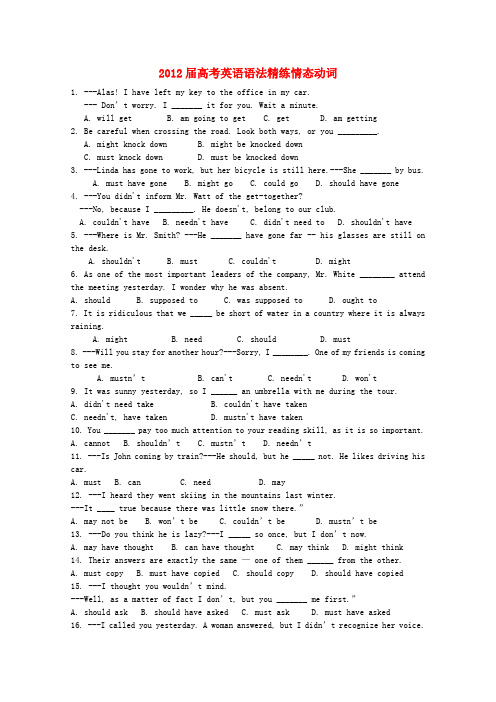
2012届高考英语语法精练情态动词1. ---Alas! I have left my key to the office in my car.--- Don’t worry. I _______ it for you. Wait a minute.A. will getB. am going to getC. getD. am getting2. Be careful when crossing the road. Look both ways, or you _________.A. might knock downB. might be knocked downC. must knock downD. must be knocked down3. ---Linda has gone to work, but her bicycle is still here.---She _______ by bus.A. must have goneB. might goC. could goD. should have gone4. ---You didn't inform Mr. Watt of the get-together?---No, because I _________. He doesn't, belong to our club.A. couldn't haveB. needn't haveC. didn't need toD. shouldn't have5. ---Where is Mr. Smith? ---He _______ have gone far -- his glasses are still on the desk.A. shouldn'tB. mustC. couldn'tD. might6. As one of the most important leaders of the company, Mr. White ________ attend the meeting yesterday. I wonder why he was absent.A. shouldB. supposed toC. was supposed toD. ought to7. It is ridiculous that we _____ be short of water in a country where it is always raining.A. mightB. needC. shouldD. must8. ---Will you stay for another hour?---Sorry, I ________. One of my friends is coming to see me.A. mustn’tB. can'tC. needn'tD. won't9. It was sunny yesterday, so I ______ an umbrella with me during the tour.A. didn't need takeB. couldn't have takenC. needn't, have takenD. mustn't have taken10. You _______ pay too much attention to your reading skill, as it is so important.A. cannotB. shouldn’tC. mustn’tD. needn’t11. ---Is John coming by train?---He should, but he _____ not. He likes driving his car.A. mustB. canC. needD. may12. ---I heard they went skiing in the mountains last winter.---It ____ true because there was little snow there.”A. may not beB. won’t beC. couldn’t beD. mustn’t be13. ---Do you think he is lazy?---I _____ so once, but I don’t now.A. may have thoughtB. can have thoughtC. may thinkD. might think14. Their answers are exactly the same — one of them ______ from the other.A. must copyB. must have copiedC. should copyD. should have copied15. ---I thought you wouldn’t mind.---Well, as a matter of fact I don’t, but you _______ me first.”A. should askB. should have askedC. must askD. must have asked16. ---I calle d you yesterday. A woman answered, but I didn’t recognize her voice.---Oh, it _____ my aunt,Jean.A. must beB. must have beenC. might beD. can have been17. It is usually warm in my hometown in March, but it _______ be rather cold sometimes.A. mustB. canC. shouldD. would18. Although this ____ sound like a simple task, great care is needed.A. mustB. mayC. shallD. should19. According to the air traffic rules, you switch off your mobile phone before boarding.A. mayB. canC. wouldD. should20. ---What sort of house do you want to have? Something big?---Well, it________ be big--that’s not important.A. mustn’tB. needn’tC. can’tD. won’t21. Peter ______ be really difficult at times even thoug h he’s a nice person in general.A. shallB. shouldC. canD. must22. ---I’m sorry. I ______ at you the other day.---Forget it. I was a bit out of control myself.A. shouldn’t shoutB. shouldn’t have shoutedC. mustn’t shoutD. mustn’t have shouted23. You park here! It’s an emergency exit.A. wouldn’tB. needn’tC. couldn’tD. mustn’t24. “You _______ have a wrong number,” she said. “There’s no one of that name here.”A. needB. canC. mustD. would25. Just be patient .You expect the world to change so soon.A. can’tB. needn’tC. may notD. will not26. Mark have hurried. After driving at top speed, he arrived half an hour early.A. needn’tB. wouldn’tC. mustn’tD. couldn’t27. --- I take the book out?---I'm afraid not.A. WillB. MayC. MustD. Need28. ---May I take this book out of the reading room?---No, you __. You read it in here.A. mightn’tB. won’tC. needn’tD. mustn’t29. I_______ have watched that movie —it’ll give me horrible dreams.A. shouldn’tB. needn’tC. couldn’tD. mustn’t30. I’m afraid Mr. Harding _______see you now. He’s busy.A. can’tB. mustn’tC. shouldn’tD. needn’t31. Doctors say that exercise is important for health, but it _________ be regular exercise.A. canB. willC. mustD. may32. I have told you the truth. ______ I keep repeating it?A. MustB. CanC. MayD. Will33. Jack described his father, who a brave boy many years ago,as a strong-willed man.A. would beB. would have beenC. must beD. must have been34. You ____ buy a gift, but you can if you want to.A. mustB. mustn'tC. have toD. don't have to35. ---Good morning. I've got an appointment with Miss Smith in the Personnel Department.---Ah, good morning. You be Mrs. Peters.A. mightB. mustC. wouldD. can36. What do you mean, there are only ten tickets? There _______ be twelve.A. shouldB. wouldC. willD. shall37. I can’t leave. She told me that I _______ stay here until she comes back.A. canB. mustC. willD. may38. One of the few things you _______ say about English people with certainty is that they talk a lot about the weatherA. needB. mustC. shouldD. can39. --- I don’t care what people think.--- Well, you _______A. couldB. wouldC. shouldD. might40. Some people who don’t like to talk much are not necessarily shy;they ______ just be quiet people.A. mustB. mayC. shouldD. would41. ---It’s the office! So you ________ know eating is not allowed here.--- Oh, sorry.A. mustB. willC. mayD. need42. The traffic is heavy these days, I ________ arrive a bit late, so could you save me a place?A. canB. mustC. need.D. might43. --- Hi, Tom. Any idea where Jane is?---She ______ in the classroom. I saw her there just now.A. shall beB. should have beenC. must beD. might have been44. It_________ have been Tom that parked the car here, as he is the only one witha car.A. mayB. canC. mustD. should45. ---I haven’t got the reference book yet, but I’ll have a test on the subject next month.---Don’t worry. You______ have it by Friday.A. couldB. shallC. mustD. may情态动词解析1. A。
情态动词练习题
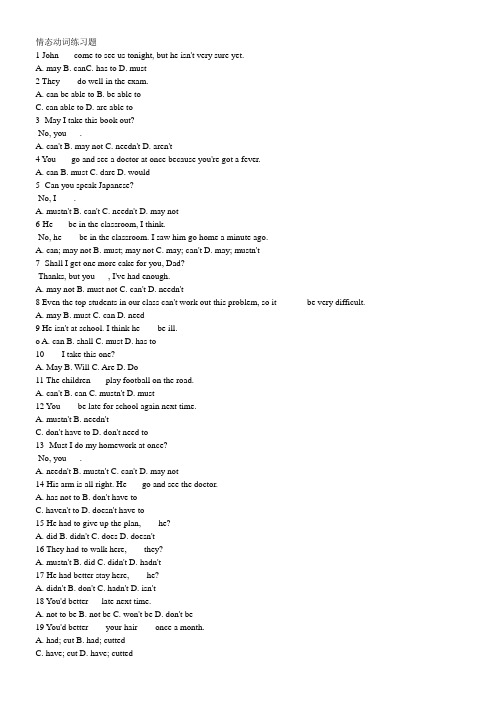
情态动词练习题1 John___ come to see us tonight, but he isn't very sure yet.A. mayB. canC. has toD. must2 They ___ do well in the exam.A. can be able toB. be able toC. can able toD. are able to3 -May I take this book out?-No, you___.A. can'tB. may notC. needn'tD. aren't4 You___ go and see a doctor at once because you're got a fever.A. canB. mustC. dareD. would5 -Can you speak Japanese?-No, I____.A. mustn'tB. can'tC. needn'tD. may not6-He___ be in the classroom, I think.-No, he ___ be in the classroom. I saw him go home a minute ago.A. can; may notB. must; may notC. may; can'tD. may; mustn't7 -Shall I get one more cake for you, Dad?-Thanks, but you___, I've had enough.A. may notB. must notC. can'tD. needn't8 Even the top students in our class can't work out this problem, so it be very difficult.A. mayB. mustC. canD. need9 He isn't at school. I think he ___ be ill.o A. can B. shall C. must D. has to10 ___ I take this one?A. MayB. WillC. AreD. Do11 The children___ play football on the road.A. can'tB. canC. mustn'tD. must12 You ___ be late for school again next time.A. mustn'tB. needn'tC. don't have toD. don't need to13 -Must I do my homework at once?-No, you___.A. needn'tB. mustn'tC. can'tD. may not14 His arm is all right. He___ go and see the doctor.A. has not toB. don't have toC. haven't toD. doesn't have to15 He had to give up the plan, ___ he?A. didB. didn'tC. doesD. doesn't16 They had to walk here, ___ they?A. mustn'tB. didC. didn'tD. hadn't17 He had better stay here, ___ he?A. didn'tB. don'tC. hadn'tD. isn't18 You'd better___late next time.A. not to beB. not beC. won't beD. don't be19 You'd better ___ your hair ___ once a month.A. had; cutB. had; cuttedC. have; cutD. have; cutted20 You___ ask that man over there. Maybe he knows the way.A. had better not toB. had not betterC. had betterD. had better not21 -Shall we go and visit the History Museum next Sunday?A. Here you areB. Sorry, I can'tC. Yes, pleaseD. Let me try22 -Why don't you ask Mike to go with us?-Thanks, ___.A. I willB. I won'tC. leanD. I may23-___ I take the newspaper away?-No, you mustn't. You____read it only here.A. Must; canB. May; canC. Need; mustD. Must; must24 Excuse me. ___ you please pass me that cup?A. DoB. ShouldC. WouldD. Must25 ___ you like to have another try?A. CouldB. WillC. WouldD. Do26 -Would you like to go boating with us?-Yes, ___.A. I'd likeB. I wantC. I'd like toD. I do27 You___ worry about your son. He will get well soon.A. needn'tB. can'tC. mustn'tD. have to28 The poor man needs our help, ___ he?A. needB. needn'tC. doesD. doesn't29 -Must we do our homework first?-No, you___. You may have a rest first.A. mustn'tB. needn'tC. may notD. can't1.ADABB2.CDBCA3.CAA4.DBC5.ABCC6.CABC8.ADB1. —That must be a mistake.—No, it _____ a mistake.A. must not beB. needn’t beC. cannot beD. would not be2. —_____ I water the trees on Tuesday?—No, you needn’t.A. CanB. MustC. MayD. Shall3. He _____ not pay unless he is punished to pay.A. shallB. willC. canD. would4. I _____ such a mistake again.A. shall never makeB. may never makeC. can never doD. need never do5. —_____ I turn on the radio?—You’d better not. It is noisy enough in this room.A. ShallB. MustC. NeedD. Do6. Let’s go to the library this afternoon, _____?A. shall weB. will weC. can weD. should we7. Where are my keys? I _____ lost them.A. ought toB. should haveC. will haveD. must have8. Even if he has time, he _____ shopping in town on Sunday.A. won’t goB. will goC. won’t go toD. doesn’t go9. He _____ finished earlier.A. shall haveB. ought toC. could haveD. must have10. In case I _____, I would try again.A. will failB. would missC. should failD. shall miss11. Since the road is wet this morning, _____ last night.A. it must rainB. it must have rainedC. it must be rainedD. it must have been rained12. He asked me if he _____ open the window.A. shallB. wouldC. willD. should13. Everyone _____ do his best to make the world safe and clean.A. canB. mayC. shouldD. had to14. _____ to have lunch with us today?A. Do you likeB. Would you likeC. Will you likeD. Have you like15. —Will you lend me your book?—Yes, I _____.A. willB. needC. canD. must16. If I had time, _____ see that new movie at the Capital Theater.A. I willB. I mayC. I shallD. I would17. The English of her composition is too good. She c an’t _____ it herself.A. have to writeB. have writtenC. writeD. be written18. You _____ the look on his face when he won the lottery.A. would have seenB. can be seeingC. must seeD. may see19. The light is out in her room; she _____ to bed.A. must have goneB. had goneC. must be goingD. must go20. They _____ that far; but they stopped to have a snack on the way.A. might be goneB. needed goC. could have goneD. ought have gone21. He _____ to the farm yesterday.A. need goB. needed goC. has to goD. had to go22. He is so strong that I _____ fight against him.A. dare notB. did dare notC. didn’t dare toD. dare not to23. I couldn’t _____ cry while I was watching the movie “To live”.A. help toB. helpC. help but toD. help but24. They asked Tom to give him a drink, but he _____.A. hadn’tB. wasn’tC. wouldn’tD. could25. As physics is hard enough, I _____ study it.A. am not ableB. couldn’tC. am not able toD. cannot26. You _____ to the meeting this morning if you have something important to do.A. needn’t to comeB. don’t need comeC. don’t need comingD. needn’t come27. _____ you fetch me some hot water?A. CanB. MayC. MustD. Might28. You _____ get down the bus until the bus has stopped.A. can’tB. needn’tC. mustn’tD. don’t29. —Would you come and join us?—I wish I _____. I am busy at the moment.A. canB. couldC. wouldD. should30. You _____ right, but I don’t think you are.A. may beB. could beC. would beD. should be31. She looks so sad. She _____ ill.A. can beB. should beC. must beD. will be32. He _____ away. We don’t see him anywhere around.A. may goB. must goC. can goD. must have gone33. He is much richer than what he _____.A. would beB. must beC. used to beD. could be34. The little kid _____ not touch the dog.A. needB. dareC. oughtD. could35. I want to go to the hospital, but you _____ with me.A. need to not to goB. do not need goC. need not goD. need go not36. When he was old, Mr Smith _____ sit for hours without saying anything.A. wouldB. shouldC. mustD. will37. Mary _____ be in London because I saw her in town just now.A. mustn’tB. isn’t able toC. may notD. cannot38. The door is still closed. He _____ the key.A. must have lostB. must loseC. need have lostD. can lost39. The bus had left, so we _____ walk home.A. have toB. oughtC. had toD. must40. You _____ see her, but I must.A. haven’tB. cannotC. mustn’tD. needn’t答案1—5 CBBAA6—10 ADACC 11—15 BDCBA 16—20 DBAAC 21—25 DADCC 26—30 DACBA 31—35 CDCBC 36—40 ADACD解析:1. cannot表示否定的推测。
(英语)高二英语情态动词真题汇编(含答案)
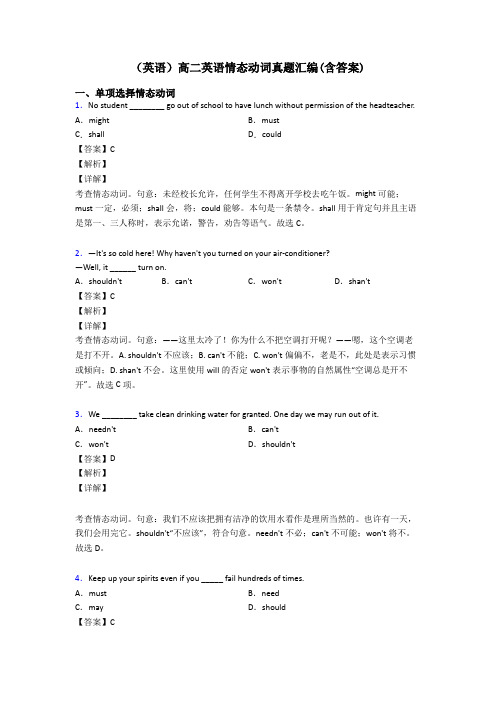
(英语)高二英语情态动词真题汇编(含答案)一、单项选择情态动词1.No student ________ go out of school to have lunch without permission of the headteacher. A.might B.mustC.shall D.could【答案】C【解析】【详解】考查情态动词。
句意:未经校长允许,任何学生不得离开学校去吃午饭。
might可能;must一定,必须;shall会,将;could能够。
本句是一条禁令。
shall用于肯定句并且主语是第一、三人称时,表示允诺,警告,劝告等语气。
故选C。
2.—It's so cold here! Why haven't you turned on your air-conditioner?—Well, it ______ turn on.A.shouldn't B.can't C.won't D.shan't【答案】C【解析】【详解】考查情态动词。
句意:——这里太冷了!你为什么不把空调打开呢?——嗯,这个空调老是打不开。
A. shouldn't不应该;B. can't不能;C. won't偏偏不,老是不,此处是表示习惯或倾向;D. shan't不会。
这里使用will的否定won't表示事物的自然属性“空调总是开不开”。
故选C项。
3.We ________ take clean drinking water for granted. One day we may run out of it. A.needn't B.can'tC.won't D.shouldn't【答案】D【解析】【详解】考查情态动词。
句意:我们不应该把拥有洁净的饮用水看作是理所当然的。
也许有一天,我们会用完它。
- 1、下载文档前请自行甄别文档内容的完整性,平台不提供额外的编辑、内容补充、找答案等附加服务。
- 2、"仅部分预览"的文档,不可在线预览部分如存在完整性等问题,可反馈申请退款(可完整预览的文档不适用该条件!)。
- 3、如文档侵犯您的权益,请联系客服反馈,我们会尽快为您处理(人工客服工作时间:9:00-18:30)。
高一英语精选情态动词练习题35道(含答案)发布人:圣才学习网发布日期:2010-09-10 09:17 共578人浏览[大] [中] [小] 1) You____ all those clothes! We have a washing machine to do that sort of thingA) needn't have washed B) shouldn't have washedC) must not have washed D) can not have washed2) John's score on the test is the highest in the class; he____ last night.A) should study B) should have studiedC) must have studied D) must have to study3) The room is in a terrible mess; it ____cleaned.A) can't have been B) shouldn't have beenC) mustn't have been D) wouldn't have been4) Nobody knows how people first came to these islands. They ____ from South America o n rafts.A) must have sailed B) can sailC) might have sailed D) should have sailed5) Mary was not in her bedroom yesterday afternoon. She ____ in her classroom.A) should have been B) must have beenC) must be D) should be6) Bob said he was going to join our club but he didn't. He ____ his mind.A) can't have changed B) wouldn't have changedC) must have changed D) shouldn't have changed7) You____ to town to see the film yesterday. It will be on TV tonight.A) needn't go B) had better not goC) should not go D) needn't have gone8) We____ the letter yesterday, but it didn't arrive.A) must receive B) ought to receiveC) must have received D) ought to have received9) With all the work on hand, he____ to the cinema last night.A) mustn't go B) shouldn't have goneC) could not go D) couldn't have gone10) Eve was late for class again. She ____earlier.A) should get up B) must get up C) need to get up D) should have got up 11) I am feeling sick. I____ so much chocolate.A) needn't have eaten B) couldn't have eatenC) mustn't have eaten D) shouldn't have eaten12) I didn't send out my application form last week, but I ____.A) had B) would do C) should have D) might have to13) Walking alone in the deserted village, John was scared.He thought he____ Tom to go with him.A) might have asked B) should askedC) must have asked D) should have asked14) When I got to the cinema, the film had already started; I____ there earlier.A) ought to get B) ought to have gotC) must have got D) must get15) The road was muddy. It____ last night.A) must rained B) must have rained C) must be rained D) could have rain ed16) She can speak quite fluent English. She____.A) must been in the U.S.A. for some timeB) must have been in the U.S.A. for some timeC) should have been in the U.S.A. for some timeD) May be in the U.S.A. for some time17) You should bear in mind that he is not so strong as he____.A) was used to be B) used to be C) was used to D) use to18)“We didn't see him at the exhibition yesterday.”“He ___it.”A) mustn't visit B) can't have visited C) should have gone to see D) m ay see19) Mary ____my letter, otherwise she would have replied before now.A) should have received B) has receivedC) Couldn't have received D) ought to have received20) I ____ you a valuable present for your birthday, but I was short of money.A) would have liked to give B) liked to giveC) have liked to give D) would like to give21)“Where ____ my umbrella?”“Somebody ____ it away by mistake.”A) is, must have taken B) is, must takeC) have been, must take D) is, takes22) What ____ would happen if the director knew you felt that way?A) will you suppose B) you suppose C) do you suppose D) you would supp ose23) Two eyes ____see more than one.A) can B) may C) will D) should24) ____ you continue in your efforts and achieve new and greater successes.A) Would B) Will C) May D) Should25) We ought to help each other in our work, ____?A) oughtn't we B) should we C) shouldn't we D) ought to we26) Tom ____ better than to ask Dick for help.A) shall know B) shouldn't know C) has known D) should have known27) You ____ your tooth pulled out before it rot completely.A) had better got B) had to get better C) had better to get D) had better get 28) When we got to the cinema, the film hasn't started yet, so we ____.A) needn't hurry B) didn't need hurryC) needn't to hurry D) needn't have hurried29) It was really very dangerous; you ____ him seriously.A) might have injured B) could injure C) should have injured D) must inj ure30) As he had heart attack, he was told that he ____ continue the work.A) needn't B) may not C) mustn't D) can't31) An Englishman who ____not speak Italian was once traveling in Italy.A) must B) could C) may D) might32) I ____like to make a suggestion.A) could B) would C) must D) might33) I know things are hard with you, but you ____try to get over the difficulties.A) can B) may C) must D) ought34 I can't find the recorder in the room. It ____ by somebody.A) may have been taken away B) may leaveC) may take away D) must have taken away35) He ____the 9:20 train because he didn't leave home till 9:25.A) can reach B) could catch C) may not catch D) couldn't have caught答案1)A 2)C 3)A 4)C 5)B 6)C 7)D 8)D 9)D 10)D11)D 12)C 13)D 14)B 15)B 16)B 17)B 18)C 19)C 20)A21)A 22)C 23)A 24)C 25)A 26)D 27)D 28)D 29)A 30)C31)B 32)B 33)C 34)A 35)D。
